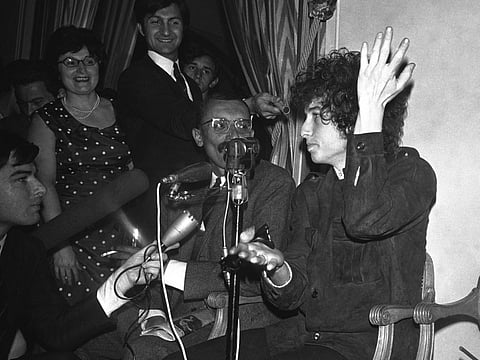Ten facts about Nobel Prize winner Bob Dylan
Where did he get his name? Why did he disappear for eight years after an accident? And who’s Blind Boy Grunt?

Bob Dylan worried fans on Thursday when his name shot up to the top of Twitter’s trending topics. It’s 2016, the year we lost David Bowie and Prince, so naturally, fans feared the worst: had something bad happened the world’s beloved folk veteran?
Thankfully not — he’d only won a Nobel Prize for Literature.
The news confused some, angered some and delighted others. While you decide how you feel about it, read ten things to know about the 75-year-old musician:
1. It’s true that the name Bob Dylan rolls right off the tongue, but Dylan was actually born Robert Allen Zimmerman. In 1962, at the start of his 20s, he legally changed his name. Anyways, his friends call him Bob (presumably). Though the rumour was he named himself after Welsh poet Dylan Thomas, Dylan told a New York Times critic: “Straighten out in your book that I did not take my name from Dylan Thomas ... Dylan Thomas’s poetry is for people that aren’t really satisfied in their bed, for people who dig masculine romance.”
2. Dylan has had several bizarre pseudonyms over the years, including Blind Boy Grunt, Bob Landy and Tedham Porterhouse.
3. In 1966, at age 25, Dylan was already exhausted by his career. He got into a mysterious motorcycle accident — no ambulance was called, nor was Dylan hospitalised, but he said he broke several vertebrae in his neck. He became relatively reclusive and didn’t tour again for nearly eight years. Later, Dylan said: “I had been in a motorcycle accident and I’d been hurt, but I recovered. Truth was that I wanted to get out of the rat race.”
4. Nonetheless, Dylan appeared alongside Joni Mitchell on the first episode of The Johnny Cash Show, an American music variety TV series, in 1969.
5. In the mid-80s, Dylan said that rock ‘n roll, as a genre, isn’t ‘serious enough’ and that it doesn’t ‘reflect life in a realistic way’. That’s why he turned to folk music. “The songs are filled with more despair, more sadness, more triumph, more faith in the supernatural, much deeper feelings.”
6. In 2007, Mark Ronson remixed Bob Dylan’s Most Likely You Go Your Way and I’ll Go Mine as part of a retrospective anthology, which was the first time Dylan had authorised a remix of one of his songs.
7. Although primarily a songwriter, Dylan did foray into the world of nonfiction writing in 2004. He wrote Chronicles: Volume One, the first of a (planned) three-part biography. The book, at 304 pages long, peaked at No. 2 on the New York Times best seller list. Volumes 2 and 3 have yet to come to fruition.
8. In 2007, Dylan was dubbed the most cited musician by lawyers and judges. His lyrics were quoted over twice the amount of times that the Beatles’ were in court. His most popular lines? “You don’t need a weatherman to know which way the wind blows” from Subterranean Homesick Blues and “when you ain’t got nothing, you got nothing to lose” from Like a Rolling Stone. (He rests his case.)
9. Though Dylan beat the Beatles in court, he didn’t quite best them when it came to sales. Dylan is widely regarded as one of the best-selling artists of all time, having sold over 100 million records, but the Fab Four, who are the best-selling act of all time, are reported to have sold 500-600 million records.
10. The Nobel Prize wasn’t the first time Dylan’s poeticism earned him recognition. In 2008, he received a special citation from the Pulitzer Prize jury for “his profound impact on popular music and American culture, marked by lyrical compositions of extraordinary poetic power.”



